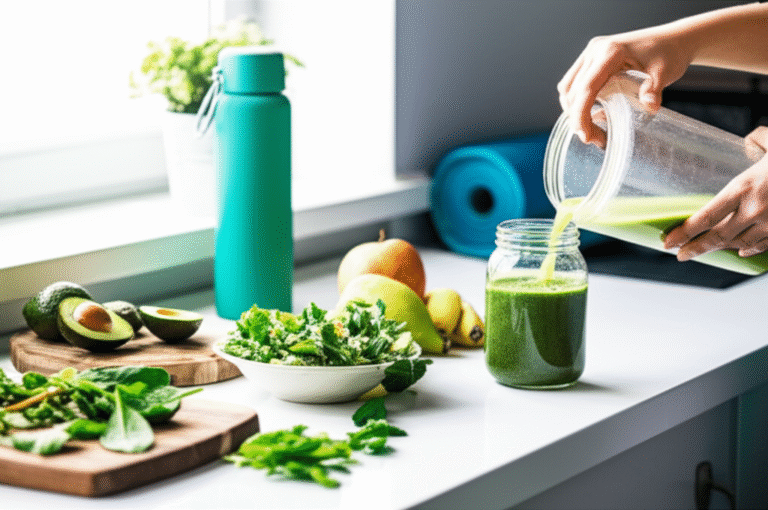MCT Foods For Weight Loss: Effortless Results
MCT foods can be a simple and effective way to boost your weight loss journey, offering effortless results by helping you feel fuller and burn more fat. Incorporating them into your diet is easier than you think!
Do you ever feel like weight loss is an uphill battle? You’ve tried the latest fad diets, spent hours at the gym, and maybe even found yourself staring longingly at a delicious treat, feeling guilty before you even take a bite. It’s frustrating when you’re putting in so much effort and not seeing the changes you deserve. What if there was a more straightforward path, one that works with your body instead of against it? What if you could tap into a natural energy source that not only helps you shed pounds but also keeps you feeling satisfied? Get ready, because we’re about to uncover how specific foods rich in MCTs can make your weight loss journey feel a whole lot easier and more rewarding.
What Are MCTs and Why They Matter for Weight Loss?

Let’s start with the basics. MCT stands for Medium-Chain Triglycerides. Think of them as special types of fats found naturally in foods like coconut oil, palm kernel oil, and dairy products. Unlike the longer-chain fats we often eat, MCTs are processed differently by your body. They’re absorbed more quickly by your liver and are sent straight to your body for energy, or they can be converted into ketones. This unique pathway is what makes them so interesting for anyone looking to manage their weight.
When it comes to weight loss, MCTs offer a few key advantages:
- Quick Energy Source: Because they’re easily digested and sent to the liver, MCTs provide a rapid source of energy. This can help combat that sluggish feeling often associated with calorie restriction and keep you motivated.
- Increased Satiety: Studies suggest that MCTs can help you feel fuller for longer. This means you might find yourself less prone to snacking between meals or overeating when you do eat, a crucial factor in reducing overall calorie intake.
- Fat Burning Potential: Some research indicates that MCTs may help increase the number of calories your body burns, a process known as thermogenesis. While not a magic bullet, this can contribute to a slight increase in your metabolism.
- Brain Boost: For those following a ketogenic or low-carb diet, ketones produced from MCTs can serve as an alternative fuel for the brain, potentially improving focus and mental clarity – something that can be a welcome boost during a weight loss journey.
It’s important to remember that MCTs are fats. While they have unique properties, they still contribute to your daily calorie intake. The key is incorporating them wisely into a balanced diet.
Top MCT-Rich Foods to Add to Your Diet
The good news is that you don’t need to drastically change your entire diet to start benefiting from MCTs. Many delicious and versatile foods are naturally rich in these beneficial fats. Here are some of the best options:
Coconut Oil
This is perhaps the most well-known source of MCTs. Coconut oil contains a good proportion of caprylic acid and capric acid, two potent MCTs. It has a distinct tropical flavor that can be a pleasant addition to many dishes.
Coconut Milk and Cream
Made from the flesh of coconuts, these products are also good sources of MCTs. Coconut milk can be used in smoothies, curries, soups, and even as a dairy-free alternative in many recipes. Coconut cream, being richer, can be used in desserts or to add creaminess to sauces.
Avocado
While not as concentrated in MCTs as coconut oil, avocados are a fantastic source of healthy fats, including some medium-chain triglycerides. They also provide fiber and essential nutrients, making them a wonderfully satisfying and nutrient-dense food. Mash them on toast, add them to salads, or blend them into smoothies.
Visual Suggestion: A vibrant image collage showcasing coconut oil, a bowl of fresh avocados, and a glass of creamy coconut milk.
Full-Fat Dairy Products (in moderation)
Butter, ghee (clarified butter), and full-fat yogurt contain MCTs. These fats are often found in the fatty portion of these foods. If you consume dairy, opting for full-fat versions can contribute a small amount of MCTs. However, be mindful of overall calorie and saturated fat intake.
Specialty MCT Oils and Powders
Beyond whole foods, there are also concentrated MCT oils and powders derived primarily from coconut or palm kernel oil. These are highly potent sources of MCTs and are often used by athletes and those looking for a significant boost. They are flavorless and can be easily added to coffee, shakes, or other cold beverages. When choosing these, look for products that specify they are 100% MCTs, often made up primarily of C8 (caprylic acid) and C10 (capric acid) for optimal absorption and ketone production.
Effortless Ways to Incorporate MCT Foods into Your Day
Now that you know what MCT-rich foods to look for, let’s talk about how to weave them into your daily routine without feeling like you’re undertaking a major culinary overhaul. The goal is simple integration.
Start Your Day with an MCT Boost
Your morning routine is a prime opportunity to incorporate MCTs.
- Bulletproof Coffee: This is a popular choice. Brew your favorite coffee, then blend it with 1-2 teaspoons of MCT oil and 1 tablespoon of grass-fed butter or ghee. It creates a creamy, frothy, and satisfying drink that can keep you full for hours. Start with a small amount of MCT oil (even 1 teaspoon) to let your digestive system adjust, as too much too soon can cause stomach upset.
- Smoothie Power-Up: Add a tablespoon of full-fat coconut milk or a teaspoon of MCT oil to your morning smoothie. It enhances the creaminess and adds valuable fats without altering the flavor significantly.
- Yogurt Parfait: Top your morning full-fat Greek yogurt with a sprinkle of unsweetened shredded coconut or a swirl of coconut cream.
Real-Life Example: Maria, who works from home, found that replacing her usual sugary cereal with a cup of bulletproof coffee helped her avoid mid-morning cravings and feel more focused throughout her workday, leading her to naturally eat less later on.
Lunchtime Satisfaction
Keep your midday meal feeling substantial and satisfying.
- Salad Enhancements: Drizzle a light vinaigrette made with olive oil and a touch of MCT oil over your salads. Add sliced avocado for extra healthy fats and creaminess.
- Hearty Soups: Stir in a spoonful of full-fat coconut milk or a teaspoon of MCT oil into your vegetable or lentil soups to make them richer and more filling.
- Sandwich Swap: Instead of just butter or mayo, spread a thin layer of mashed avocado on whole-grain toast for your sandwich.
Smart Snacking with MCTs
When hunger strikes between meals, reach for M CT-rich options.
- Coconut Yogurt: A serving of full-fat coconut yogurt can be a healthy and satiating snack.
- Avocado Toast: A small slice of whole-grain toast topped with mashed avocado and a sprinkle of sea salt is a quick win.
- A small handful of nuts (though not high in MCTs, they are good fats and fiber) paired with a few tablespoons of coconut flakes can also make for a satisfying snack.
Dinner Dishes with a Difference
Even dinner can benefit from a touch of MCTs.
- Curries and Stir-fries: Use full-fat coconut milk as the base for your curries or stir-fry sauces. The healthy fats help you feel fuller and can enhance nutrient absorption.
- Roasted Vegetables: Lightly toss your vegetables with a teaspoon of MCT oil or coconut oil before roasting.
- Creamy Sauces: For a dairy-free option, blend soaked cashews (a good source of healthy fats, though not high in MCTs) or use a bit of coconut cream to create creamy sauces for pasta or chicken.
Dessert Delights
Yes, you can even incorporate MCTs into your sweet treats!
- Coconut Ice Cream: Opt for store-bought or homemade ice cream made with coconut milk.
- Chia Seed Pudding: Mix chia seeds with coconut milk and your favorite sweetener, letting it thicken in the fridge.
- Energy Balls: Combine rolled oats, nut butter, and a teaspoon of MCT oil for a healthy, portable energy boost.
Visual Suggestion: A beautifully styled photo of a bulletproof coffee with a swirl of cream, and another of a colorful salad featuring avocado.
MCT Foods For Weight Loss: Sample Weekly Meal Plan
To make things even easier, here’s a sample meal plan showcasing how you can easily integrate MCT-rich foods throughout your week. Remember to adjust portion sizes based on your individual needs and activity levels.
Visual Suggestion: A table format for clarity.
| Day | Breakfast | Lunch | Dinner | Snack Options |
|---|---|---|---|---|
| Monday | Bulletproof Coffee (☕️ 1 tsp MCT oil, 1 tbsp ghee) | Large salad with grilled chicken, mixed greens, cucumber, tomatoes, and a vinaigrette with 1 tsp MCT oil. | Salmon baked with lemon and herbs, served with roasted asparagus (tossed with coconut oil). | 1/4 cup unsweetened coconut flakes, handful of almonds |
| Tuesday | Full-fat Greek yogurt with berries and a sprinkle of unsweetened shredded coconut. | Leftover baked salmon and asparagus. | Chicken stir-fry with broccoli, bell peppers, and snap peas, using full-fat coconut milk in the sauce. | 1/2 avocado with sea salt |
| Wednesday | Smoothie: Spinach, banana, protein powder, 1 tbsp full-fat coconut milk. | Tuna salad (made with avocado instead of mayo) on whole-grain crackers. | Lentil soup with a swirl of coconut cream. | Hard-boiled egg, a few squares of dark chocolate (70% cocoa or higher) |
| Thursday | Scrambled eggs cooked with 1 tsp coconut oil, served with a slice of avocado. | Leftover lentil soup. | Lean ground turkey meatballs in a rich tomato sauce, served with zucchini noodles. | Small apple with 1 tbsp almond butter |
| Friday | Overnight oats made with almond milk, chia seeds, and 1 tsp MCT oil. | Large Cobb salad with lean protein, avocado, and a light dressing. | Shrimp and veggie skewers (marinated in olive oil, garlic, and lemon), served with a side of quinoa. | 1/2 cup full-fat coconut yogurt |
| Saturday | Bulletproof Coffee (☕️ 1 tsp MCT oil, 1 tbsp ghee) | Homemade chicken salad (made with plain Greek yogurt and diced celery) on lettuce wraps. | Homemade pizza on a whole-wheat crust with lean protein and plenty of vegetables, drizzled with a touch of olive oil. | Handful of walnuts, a small piece of fruit |
| Sunday | Full-fat cottage cheese with sliced peaches. | Leftover pizza. | Roast chicken with root vegetables (carrots, sweet potatoes tossed with olive oil). | 1/4 cup unsweetened coconut flakes |
Important Considerations and Potential Downsides
While MCT foods are beneficial for weight loss for many, it’s crucial to approach them with awareness. Mishu Shohan always emphasizes understanding the full picture.
Digestive Adjustment Period
As briefly mentioned, introducing MCTs, especially in concentrated forms like MCT oil, can sometimes lead to digestive discomfort like nausea, cramping, or diarrhea, particularly if you consume too much too soon. It’s highly recommended to start with a very small dose (like half a teaspoon or one teaspoon) and gradually increase it over several days or weeks as your body adapts. This is why starting with whole foods like avocado and coconut milk is often the gentlest approach.
Calorie Density
Remember, MCTs are fats, and fats are calorie-dense. A tablespoon of coconut oil, for instance, contains about 120 calories. While beneficial, overconsumption without accounting for these calories can hinder weight loss efforts. Portion control is key, just as with any other food group. You’re aiming to replace less beneficial fats or simply add them thoughtfully, not just pile them on.
Not a Magic Bullet
MCTs can be a supportive tool for weight loss, but they are not a miracle cure. Sustainable weight loss still relies on a calorie deficit, a balanced diet rich in whole foods, regular physical activity, adequate sleep, and stress management. Think of MCTs as a helpful assistant in your weight loss journey, not the sole driver.
For more comprehensive dietary guidance, resources from reputable health organizations can be invaluable. The American Heart Association’s healthy eating recommendations provide a great foundation for building a balanced diet.
Individual Responses Vary
Everyone’s body is different. What works wonderfully for one person might have a different effect on another. Pay attention to how your body feels and responds when you incorporate MCT-rich foods. Some people might experience more significant appetite suppression than others, while some may have more pronounced metabolic effects.
Frequently Asked Questions About MCT Foods for Weight Loss
Can I lose weight just by eating MCT foods?
While MCT foods can support weight loss by helping you feel fuller and potentially boosting metabolism, they are not a standalone solution. Sustainable weight loss also requires a calorie deficit, balanced nutrition, and regular physical activity.
How much MCT oil should I take daily?
It’s best to start with a small amount, like 1 teaspoon per day, and gradually increase to 1-2 tablespoons per day as you tolerate it. Listen to your body and avoid consuming too much too quickly to prevent digestive upset.
Are there any side effects of eating MCT foods?
Some people may experience digestive issues like nausea or diarrhea, especially when first introducing concentrated MCTs like MCT oil. Starting with small amounts and increasing gradually can help mitigate these side effects.
Can I use MCT oil in hot drinks?
Yes, MCT oil can be added to hot beverages like coffee or tea. It’s often blended into coffee for “bulletproof coffee.” Be aware that prolonged high heat might degrade some of the MCTs, but moderate heat exposure is generally fine.
Which MCT food is best for beginners?
For beginners, starting with whole food sources like avocado or full-fat coconut milk in moderation is often the easiest and most gentle way to introduce MCTs. This allows your body to adapt without the concentrated dose of MCT oil.
Conclusion: MCT Foods for Weight Loss
Incorporating MCT foods for weight loss is one of the simplest ways to make your diet work smarter, not harder. From coconut oil and avocados to specialty MCT oils, these fats provide quick energy, help curb cravings, and may even boost your body’s fat-burning potential.
But remember—MCTs are not a magic pill. The real results come when you combine them with a balanced diet, regular movement, and mindful eating. Start small, listen to your body, and gradually build MCT-rich foods into your daily meals.
If you’re ready for effortless results, let MCTs be your secret weapon in creating a healthier, more energized, and sustainable lifestyle.



